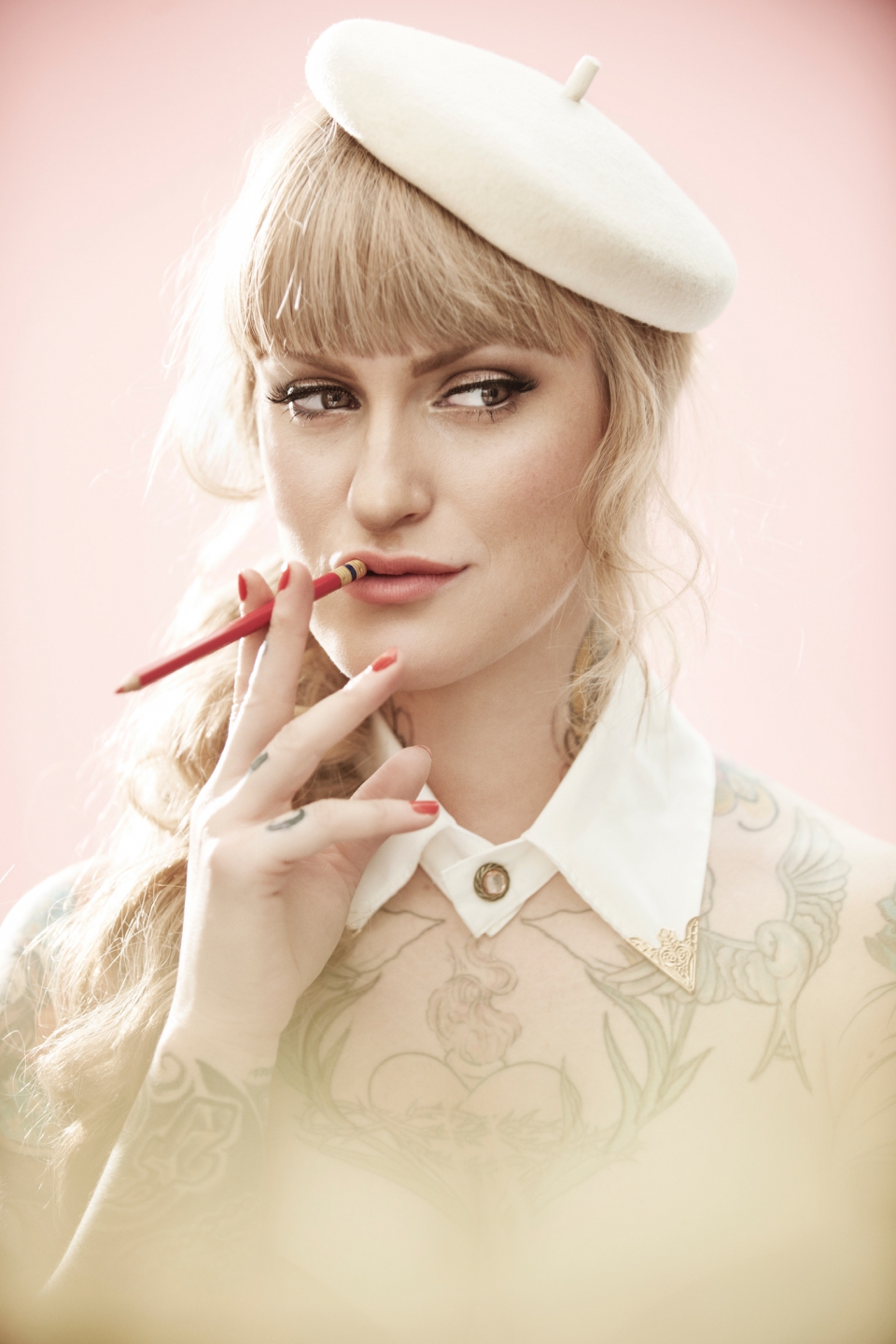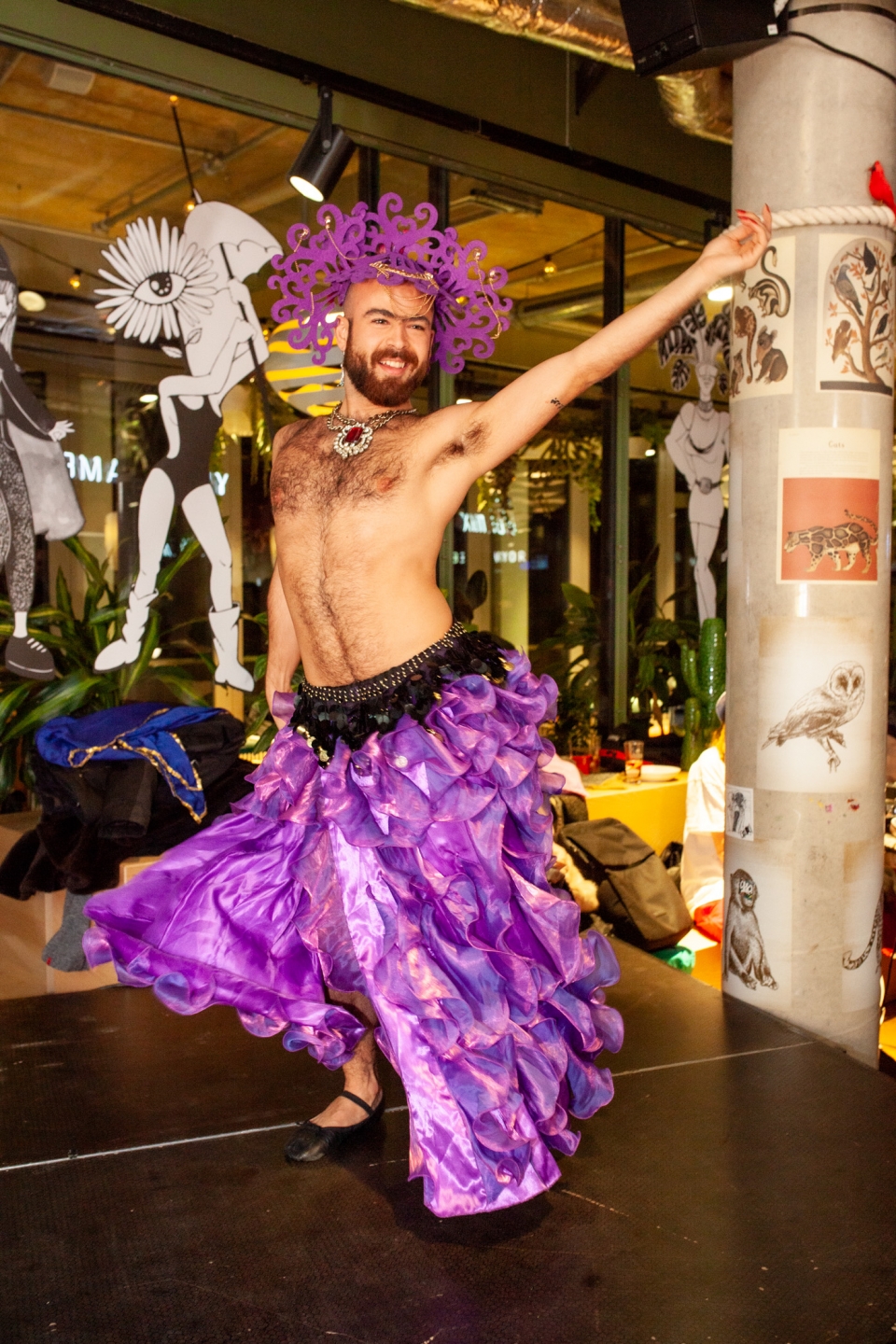Because of the corona pandemic, many Berliners were forced to adjust or even completely rethink their careers. Having their professional opportunities or carefully devised plans suddenly wrecked, some might be considering taking matters into their own hands and going freelance. But what’s it really like to turn your art or hobby into a career? We’ve collected some expert advice from people who’ve made it happen before Corona hit and are now established in their respective fields. Read on to find some words of wisdom and inspiration from a wide array of Berlin-based creatives with fascinating careers, including a ceramic artist, a belly dancer, and a tarot card reader.
PART I: THE CREATOR
Let’s say you’ve just found a unique hobby and perfected your skills to a degree that you think deserves some serious recognition. Should you just go ahead and try to monetize it? Hold your horses. According to the iconic tattoo artist and illustrator Guen Douglas: “Pursuing your passion IS for everyone, but pursuing it as a business is not. For some, it can suck the joy out of an activity that was potentially a relaxing and healthy creative outlet.” However, if you’re seriously considering transforming your art into a career, this article is here to help you figure out if you’ve got what it takes.
And it basically takes a village – but you’re its only dweller. As explained by Guen: “to be a successful freelancer you have to be prepared to work your ass off, shamelessly self promote, be organized, prepared for large financial swings, be able to either do or delegate the paperwork, be good at coping with rejection and most importantly be great at self-motivating. Essentially You have to be the boss of everything.”

Guen Douglas, photo: fotofloor
The fantastic ceramic artist Violaine Toth is also not sugar-coating the reality that defines the characteristics a freelancer needs to get by. However, she also acknowledges that the self-employed can avoid many constraints of a typical 9 to 5 job: “You have to be able to handle stress, pressure, short deadlines, not being able to sleep so much. [Working as a freelancer] requires a lot of regularity, structure, organization – so if you’re fine with all that, then it’s definitely for you. And at the same time, if you can’t handle working in a group or getting orders from someone else and you need your freedom – freedom of your time but also your creative freedom, [going freelance is] definitely for you as well.”
This freedom facilitates plenty of adjustments that can improve your personal freelancing experience. As Sophia Hoffmann, a legendary vegan chef and food writer, says: “You need a certain level of self-discipline but I think that this can also be learned. If you have problems making up your own schedule every day, work in teams, work at an office space, create a structure that works for you.”
So while this leap will certainly not be effortless, you might end up being very glad that you took it. Just like Tommy Vowles, a fashion designer who creates unique vegan leather pieces: “I had a lot of limiting beliefs about what I was capable of that kept me in jobs that I didn’t like. I worked hard to shake those ideas and have been fully self-employed for a year, there is no going back now.”
Hannah Graves, who, as Cult Mother, brings clarity to the world one tarot reading at a time, admits: “[Being self-employed] is a rollercoaster – and not everyone is going to enjoy the ride.” That being said, she actively encourages everyone to just consider it: “I had to do a lot of work to unpack my internalized capitalism and the fear and doubt that comes with it in order to move forward with Cult Mother. Which is why Tommy [Vowles] and I now offer workshops to help other people to do the same. I think it’s worth at least trying to see if it’s for you or not, or else, you may always wonder – what if?”

Violaine Toth, photo: Mateo Bonavita
PART II: THE REVELATION
Artists choose to start their freelance careers under all sorts of circumstances. Kamila Majcher, the creator of the Instagram sensation Very Ugly Plates, didn’t rush into making this project her main gig until there was just no other way around it: “When I started making plates I still had a full-time job. When I realized that because of it, I didn’t have enough time to fulfill my plate orders, I decided to quit and focus just on my art.”
The Darvish, the belly dancer who’s been gracing Berlin stages for a few years now, was slightly surprised by the advent of his freelance career: “It was clear to me after being booked and asked for a company or management… that my hobby and passion became a career! Even the process of picking my stage name and presence was very much spontaneous. It all started with one show that was meant to be only a one time thing and it meant the world to me to stand up and represent who I am and the community behind me.”
For Hannah Graves, self-employment was the result of a profound realization: “I came into contact with the fact that working with cards was more than a hobby. It was a calling that I just couldn’t ignore any longer – even if some part of me wanted to.”
Finally, Violaine Toth simplifies the decision-making process: “I knew my dream job didn’t exist – nobody [in Berlin] would hire me to be a potter, so I just did it.”

Sophia Hoffmann, photo: iHeartBerlin
PART III: THE PROCESS
So you muster up the courage, get registered at the Finanzamt, and make a folder for all the upcoming invoices. But what now? How do you make freelance work actually work for you, not just your clients?
Although self-employment usually brings along a sense of freedom, it’s possible to lose sight of your well-being while chasing the dream. As Tommy Vowles admits: “After a year […] I’m getting better at asking for help and being kinder to myself but I can definitely overwork myself. For most of this time, I’ve been the only one making and I’ve been running socials and customer service. That is a lot for one person and it’s easy for the social media side of it to creep into my downtime, but I’m learning.”
Sophia Hoffmann acknowledges similar challenges: “Work/Life Balance: Still working on it. I was close to a burnout several times in the last five years and I am aware of that, I LOVE to be busy and get shit done but at the same time, I still need to learn better how to prioritize. It’s a journey. Mentally and physically exhausting at times, but also super exciting and joyful.”
After all, you’ll reap what you sow: “Going pro has enabled me to connect with people all over the world and every single session furthers my practice. It IS harder to maintain a work/life balance though, but I was always rubbish at that – and at least now all that extra time, energy, and sacrifice is for my own business. I got tired of using my skill set to make other people a lot of money.”, says Hannah Graves.
Another daily challenge for a self-employed artist is staying inspired. What if the muses keep silent, yet your livelihood depends on them? Guen Douglas sees this question as an essential part of the freelance experience: “For me, nothing inspires like the panic of a deadline. Maybe that’s the key to being freelance, can you cope under sometimes crushing pressure and still produce something creative that you can be proud of?” But there’s more to staying inspired than the struggle to keep up with your calendar: “The best inspiration advice I can give would be to allow yourself to explore anything and everything that interests or piques your curiosity. Don’t follow what everyone else is doing, follow the white rabbit.”, says Guen.
Tommy Vowles also mentions a deadline-induced creative rush, but otherwise, he emphasizes the importance of less intense inspiration sources: “You have to be really really kind to yourself. Everyone works differently but my aha moments don’t come when I’m overwhelmed. I work well under pressure and get a weird thrill out of deadlines, but my most creative intuitive thinking comes when I’m happy and grounded. Quality downtime with loved ones is an invaluable resource.”

Tommy Vowles
Because self-employment can be all-consuming, it’s important to take breaks whenever you can. Violaine Toth sees taking some time off as necessary: “Don’t follow too many people on Instagram that are related to your art or doing the same medium or having the same aesthetic, because you’re going to unconsciously copy them. Be curious – travel (if you can travel), go to events that can show you other medium and art, read books. And also disconnect from work sometimes and accept that you can be uninspired and it’s okay and it’s normal and it’s gonna come when the time is gonna be right.”
Sophia Hoffmann points to the inspirational value of professional relationships: “Listen and learn. Work with other people, do networking. Build networks. I benefited from every dinner, every event I cooked with another chef and I have the most amazing people I do my books with, it’s a blessing.”
The Darvish also believes surrounding yourself with the right crowd is crucial to staying inspired: “Have creative people around you – from friends to artists you admire – and keep your eye in the art community. Especially in Berlin, it’s magical and inspiring in so many ways.”

The Darvish, photo: Raphael Medina
PART IV: BERLIN
Indeed, Berlin is a unique city with its specific advantages and challenges. We believe the former still outweigh the latter, but how well does the city score as a location for freelance creatives?
Kamila Majcher leaves no illusions as to the time-consuming traps that are awaiting: “Berlin is a city of possibilities if you know what you want and you are ready to sacrifice parties and fun every weekend.” Guen Douglas observes: “The chill vibe here can dampen motivation.”
Violaine Toth appreciates Berliners’ openness: “I really have the feeling that in Berlin as an artist you really get the respect you deserve and people don’t ask you to show any cover letter, CV or portfolio to collaborate. It’s very spontaneous – when you want to work with another artist or a company, you just send a message through Instagram or you come directly and talk to them.”
Tommy Vowles enjoys the presence of other artists: “I have found a home here among other creatives and we support and uphold each other, creativity thrives in communities. The only thing that I still struggle with is all the paperwork, but that’s a small price to pay.”
According to Hannah Graves, the mazes of bureaucracy aren’t easy to navigate, no matter the city: “It can be tough getting set up but I think it’s the same anywhere. The system isn’t designed to make gaining autonomy easy or attractive!” But she goes on to say: “Berlin is a fantastic city to freelance in. There’s so much opportunity to network and to get creative.”

Kamila Majcher
PART V: YOUR CUE
So far so good? If you’ve carefully weighed out the pros and cons of going freelance and think you’re ready for this venture, you shouldn’t miss these closing remarks. It’s a collection of the most treasured advice from some of the awesome creatives who’ve shared their insights with us.
Hannah Graves: “I’ve had so much great advice and support from so many people but to this day, it’s probably ‘when you’re done, you’re done’. It applies to so much. When you’ve reached a closing chapter, you just know it – and staying on or continuing past that is pointless – it’s never going to be different and it isn’t going to change – just walk away. I’m grateful for the mistakes I’ve made too as they’ve all taught me. My top tip would be – don’t read forums. Don’t let other people’s negativity or the problems they have encountered become your story before you’ve even started!”
Sophia Hoffmann: “I got great advice from my ex-partner: I was developing a recipe and it didn’t work right away. He said: ‘Try it until it works!’ – very simple advice but I needed to hear it, it ultimately taught me to keep my stamina and push through things more. I got several weird/ bad pieces of advice over the years when I worked with managements that tried to turn me into a certain brand: Don’t be too political. Dress sexier. Blablabla… I am so glad I found my activist feminist voice these days because it is such an important aspect of my public work!” You can also check out the episode of Sophia’s podcast (in German) about becoming a professional cook.
Guen Douglas: “Creatives gatekeep. Be prepared to be sent away, dissuaded, rejected, and to not have opportunities shared with you. I often hear people complain about this gatekeeping in the arts. But it serves a purpose to keep out those that don’t have the gumption. Be relentless and if this is too much, keep your hobby a hobby, enjoy it and treasure it! Not everything we create needs to be sold for it to have value.”
Violaine Toth: “As soon as you give time to something, then you’re going to have results. So if you give all your time to classes, then you’re going to get requests for workshops. If you give all your time to your artistic practice, then eventually you’re going to have orders for your own pieces.“

Hannah Graves, photo: Roger Sabaté

